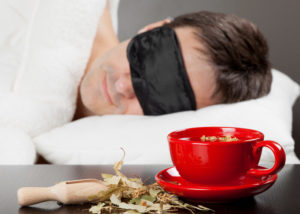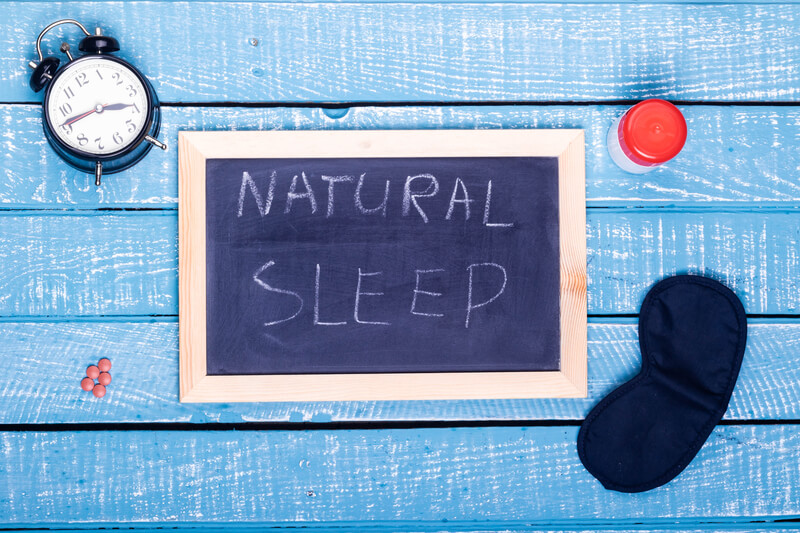Looking for the strongest natural sleep aid? In this post, we’ll explore the most effective natural remedies.
Many people turn to natural alternatives when they have difficulty sleeping. These remedies offer a gentle approach and often come with other benefits. From calming herbal teas to relaxing essential oils, there are options that may provide the rest you’ve been seeking.
They’re pretty safe, too, when used as directed unlike some pharmaceuticals.
Safety of natural sleep aids
Understanding the potential risks and side effects is crucial when considering these products. While they are generally considered safer than pharmaceutical options, it’s important to be aware of any possible adverse effects or allergic reactions that may occur.
Some individuals may experience minor side effects such as drowsiness, dizziness, or gastrointestinal discomfort when using natural sleep aids. Be sure to read the labels and follow the recommended dosage instructions.
To choose safe and reliable natural sleep aid products, do the following:
-
Research brands: Look for reputable brands with a history of producing high-quality supplements. Check if they undergo third-party testing for purity and potency.
-
Check ingredients: Pay attention to the ingredients list on the packaging. Make sure you aren’t allergic to any of them or have any known sensitivities.
-
Consult a health practitioner: Before trying any new sleep aid, consult with someone who can evaluate your situation and provide guidance based on your individual needs.
Top natural sleep aids
Nature has provided us with an array of powerful herbs and supplements that can work wonders for improving our sleep. Here are some top contenders:
-
Melatonin: This hormone plays a crucial role in regulating our sleep-wake cycle. Taking melatonin supplements can help reset your internal clock, reduce sleep latency, and promote deep, uninterrupted sleep.
-
Valerian: Known for its calming properties, valerian root is often used.
-
Chamomile: A cup of chamomile tea before bed has been cherished as a soothing ritual by many cultures. Chamomile contains apigenin, an antioxidant that binds to certain receptors in the brain, promoting relaxation and better sleep.
-
Lavender: The scent of lavender has long been associated with relaxation.
Explore non-habit-forming alternatives that can promote deep slumber.
Many over-the-counter (OTC) sleep aids are available, unfortunately, they come with the risk of dependency or morning grogginess. Fortunately, several non-habit-forming options exist:
-
Magnesium: This mineral helps relax muscles and regulates neurotransmitters involved in promoting calmness. Adding magnesium-rich foods like nuts, seeds, and leafy greens to your diet or a magnesium supplement can contribute to better sleep.
-
Tryptophan: Found in foods such as turkey, eggs, and nuts, tryptophan is an amino acid aiding in producing serotonin and melatonin. Eating tryptophan-rich foods at dinner may support improved sleep quality.
Learn about scientifically backed ingredients proven to support healthy sleep patterns.
Rely on ingredients backed by scientific evidence. Here are some well-researched options:
-
Passionflower: This herb has been used traditionally as a sedative and anxiety reliever. Scientific studies have shown passionflower can improve sleep quality and reduce insomnia symptoms.
-
L-theanine: Found in green tea, L-theanine promotes relaxation without causing drowsiness. It can reduce anxiety and stress levels.
Discover how certain nutrients can contribute to better overall sleep health.
In addition to herbs and supplements, some nutrients play a role in promoting healthy sleep patterns:
-
Vitamin B6: This vitamin is involved in the production of neurotransmitters like serotonin and melatonin. Consuming foods rich in vitamin B6, such as fish, poultry, bananas, and chickpeas, may aid in regulating sleep patterns.
-
Omega-3 fatty acids
Home Remedies for Better Sleep
Good sleep hygiene
Creating a relaxing bedtime routine is essential for promoting better sleep. Establish consistent habits. They signal it’s time to wind down. Here are some practical tips to help you create an optimal sleep environment:
-
Set a regular sleep schedule: Going to bed and waking up at the same time every day helps regulate your body’s internal clock.
-
Create a calming atmosphere: Make your bedroom a sanctuary by keeping it cool, dark, and quiet.
-
Avoid electronic devices before bed: The blue light emitted from screens can interfere with your sleep cycle.
-
Take a warm bath, read a book, or say prayers before bedtime.
Address your environment
Sometimes external factors can disrupt our sleep without us even realizing it:
-
Noise pollution: Invest in earplugs or use white noise machines to block out disruptive sounds.
-
Temperature control: Ensure your bedroom is at an optimal temperature for sleeping comfortably.
-
Comfortable bedding: Choose pillows, mattresses, and sheets that provide adequate support and comfort.

Equipment like a sleep mask can also make a difference in your quality of sleep.
Diet and exercise
Adjusting your diet and exercise habits can also impact your sleep:
-
Watch what you eat: Avoid heavy meals close to bedtime. They may cause you to urp up when you try to sleep.
-
Limit caffeine intake: Stimulants like coffee or energy drinks can interfere with falling asleep.
-
Regular physical activity: Exercise can help regulate your sleep-wake cycle.
Natural Sleep Remedies
In addition to lifestyle changes, natural remedies can provide relief for sleep issues:
-
Herbal teas: Chamomile, hops, valerian root, and lavender teas are known for their calming properties.
-
Aromatherapy: Essential oils like lavender or bergamot can be used in a diffuser or applied topically to promote relaxation.
-
Warm beverages: Enjoying a cup of hot cocoa, atole, or warm milk before bed may have a soothing effect on your body.
Essential oils for sleep support
Essential oils have gained popularity in recent years for their calming properties and ability to promote relaxation before bed. These natural extracts from plants are commonly used in aromatherapy to improve sleep quality.
One of the most well-known essential oils for sleep is lavender oil. Lavender aromatherapy has been shown to reduce anxiety levels, lower heart rate, and induce a state of relaxation. Its soothing scent has been used for centuries to aid in falling asleep faster and experiencing deeper sleep throughout the night.
Chamomile oil is another popular choice. This gentle essential oil has sedative properties that calm the mind and prepare it for rest. Incorporating chamomile oil into your nighttime routine may alleviate insomnia symptoms and enhance overall sleep quality.
Now that we’ve explored some essential oils known for their sleep-inducing qualities, let’s discuss different methods of incorporating them into your routine:
-
Diffusing: Add a few drops of your preferred essential oil, such as lavender or chamomile, to an aromatherapy diffuser. The diffuser will disperse the scent throughout your bedroom, creating a relaxing atmosphere conducive to sleep.
-
Topical Application: Dilute a few drops of essential oil with a carrier oil like coconut or jojoba, and massage it onto your temples, neck, or wrists before bedtime. This allows the aroma to be absorbed through your skin and provides a calming effect.
-
Bath Soaks: Create a luxurious, calming bedtime ritual by adding several drops of essential oil to warm bathwater. The steam will release the aroma while you soak, helping you unwind and prepare for a peaceful slumber.
Valerian root extract: A powerful natural sleep aid
Valerian root extract has gained popularity as a natural sleep aid. Let’s delve into the reasons why.
Uncover the benefits of valerian root extract.
Valerian root extract, derived from the Valeriana officinalis plant, has been used for centuries to promote relaxation and induce sleep. This herbal supplement offers various advantages. One key benefit is its ability to improve sleep quality by reducing the time it takes to fall asleep and enhancing deep sleep duration.
Learn about active compounds in valerian root.
The sedative properties of valerian root can be attributed to its active compounds, including valepotriates, volatile oils (such as bornyl acetate), and most notably, valerianic acid. These components work together to enhance GABA levels in the brain—a neurotransmitter known for promoting relaxation—and inhibit certain enzymes responsible for breaking down GABA.
By increasing GABA levels in the brain, valerian root extract produces a mild sedative effect. This natural approach stands out from synthetic alternatives like diphenhydramine found in over-the-counter medications since it doesn’t induce morning grogginess or dependency.
Discover how valerian root can help reduce anxiety.
Anxiety and stress often act as barriers to a good night’s sleep. By reducing anxiety levels, valerian root promotes a sense of calmness, making it easier to fall asleep naturally.
For valerian root extract, the recommended dosage typically ranges from 300-600 mg taken 30 minutes to two hours before bedtime. Individual responses vary. Starting with a lower dose and increasing if necessary is advisable.
While generally safe for short-term use, some individuals may experience mild side effects such as headaches or stomach discomfort.
CBD for sleep
CBD has gained popularity as a natural sleep aid in recent years.
It interacts with the body’s endocannabinoid system, which plays a crucial role in regulating various physiological processes including sleep. Studies have suggested CBD may have calming effects on the central nervous system.
Exploring different forms of CBD products
CBD comes in various forms that can be used to support better sleep. These include oils, capsules, gummies, and topical creams or lotions. Each form offers its own advantages depending on personal preferences and needs. For example:
-
CBD oils: These are versatile and easy to use by placing drops under the tongue or adding them to beverages.
-
CBD capsules: They provide a convenient way to incorporate CBD into your daily routine.
-
CBD gummies: These chewable treats offer a tasty option while providing precise dosing.
-
Topical creams or lotions: Applied directly to the skin, they may help relax muscles and ease tension before bedtime.
- Tea: Many people enjoy CBD consumed in this form.
Choosing the right form depends on individual preferences and desired effects.
FAQs
Are natural sleep aids safe?
Natural sleep aids can be safe when used as directed and in moderation. However, it’s essential to consult with a healthcare professional before incorporating any new supplements into your routine, especially if you have underlying health conditions or are taking other medications.
How long does it take for natural sleep aids to work?
The effectiveness of natural sleep aids can vary from person to person. Some may experience immediate results, while others may require several days or weeks before noticing improvements in their sleep quality. It’s important to be patient and consistent with your chosen remedy.
Can I combine different natural sleep aids?
Combining different natural sleep aids may not always be recommended unless specifically advised by a healthcare professional. Mixing multiple remedies without proper guidance could lead to unwanted side effects or interactions between ingredients. This is true even though many “natural sleep remedies” are sold this way.
Are natural sleep aids addictive?
Most natural sleep aids aren’t considered addictive. However, it’s crucial to use them responsibly and as directed. If you have concerns about dependency or addiction, consult with a healthcare professional for personalized advice and guidance.
Also on the blog:
Gabriel Salazar is a writer who is bothered by occasional insomnia. He compiled this information to help him get to sleep in a timely manner so that he can get up the next morning refreshed and ready to go. “I hope that it helps you, too,” he says.
Some of the links in this post are affiliate links. This means that if you click on the link and purchase the item, the DRS receives a small commission at no extra cost to you. All opinions remain unaffected by this arrangement.
